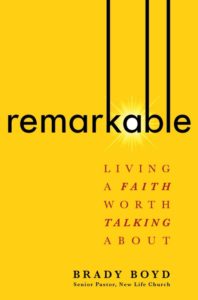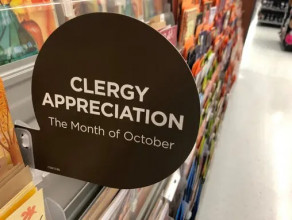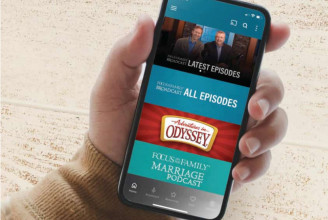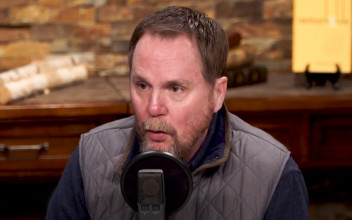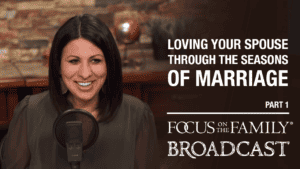Excerpt:
Pastor Brady Boyd: And that’s the power of the Great Commission is to go outside of your comfort zone. Go to a people that misunderstand each other and to have common dialogue, to have conversations with people that turns into a witnessing moment.
End of Excerpt
John Fuller: Pastor Brady Boyd is our guest today on Focus on the Family with Jim Daly. He’ll be talking about how you can impact the culture through the love of Christ. Thanks for joining us today. I’m John Fuller.
Jim Daly: John, I wonder how often we, as Christians really stop to think about how others around us view our faith and if our actions and words communicate the heart of God. I can confess, sometimes (laughter) I do that well; sometimes I don’t. And it usually is around the idea of convenience. Like, I’m in a fast-food line, and something is not happening the way it should, I can turn into the ugly American. I’ve really noticed that traveling globally. Our services here are so high. And when you get overseas, you end up being very frustrated with the lack of service.
John: Mm-hmm.
Jim: And you feel it bubble under you – errr. But you know what? That’s not what God calls us to, patience and kindness and those things that don’t come naturally to us. And we’re going to talk about the importance of having a loving heart and demonstrating God’s grace to others, which sometimes does not come – I would say all the time – does not come naturally to our flesh. Pastor Brady Boyd is the senior pastor of New Life Church. It’s where Jean and I attend here in Colorado Springs. And he’s the author of a new book called Remarkable. Brady, welcome to Focus.
Brady: It’s so good to be with both you guys. And this topic is so important right now for us to talk about, and it’s why I wrote the book. I think we’re living in a really, really remarkable time where the American Christian has an opportunity to be tremendous witnesses right now. So, I’m so excited…
Jim: Yeah.
Brady: …To talk about this topic with both of you. I think it’s really critical we get this right.
Jim: Well, this is – it’s funny. The – your first chapter of your book – a quote right at the top of the page caught my attention. It’s Alice Cooper, the rock star.
Brady: (Laughter).
Jim: And you said there, a quote from him – “Drinking beer is easy. Trashing your hotel room is easy. But being a Christian, that’s a tough call. That’s rebellion.” I mean, what a quote.
Brady: (Laughter) I love it.
Jim: Of course, he’s come to faith in Christ. But, man, that’s amazing.
Brady: Well, I think even people outside the faith realize how radical it is to follow Jesus. And I think, actually, we have sanitized the Christian faith where it’s kind of lost its revolutionary, radical tendencies. And quite actually – honestly, um, the Christianity has always been revolutionary. It’s always been countercultural. It’s always been a remarkable faith. And I think we have sanitized it, and we have, uh, maybe dumbed it down a little bit, where it’s lost its ability to change lives. And when it changes lives, it changes cultures.
And really, one of the reasons I wrote the book is because I believe Christianity is at its best when it is helping those on the margins of our culture. When it’s really the minority work in the margins of the culture, Christianity is always at its purest and most powerful when it’s pushed out to the margins.
Jim: Sure.
Brady: And so, in many cases, Christianity in America has been pushed out to the margins, where we find ourselves now the minority in our country. You know, we find ourselves struggling to regain the power of yesteryear, right? But that’s not always a bad thing, because in that setting, when we’re pushed out to the margins, we actually find the very people that the gospel was intended to reach.
Jim: Brady, let’s get into your background because, uh, you grew up in Louisiana, I believe. Uh, you were pretty rebellious. You kind of have that story. What was happening through your teen years and prior to coming to Christ in your 20s, right?
Brady: Yeah, I was. I mean, I grew up in a home where my mother primarily brought me to church three times a week – you know, Sunday morning, Sunday night, Wednesday night. And any other night that there was something going on at the church my mom made sure that I was on – with her. My dad did not become a believer until after I had already gotten out of the home. So, I didn’t grow up with a Christian dad, but I grew up with a devoted mom who prayed me into the kingdom, quite honestly. She was a prayer warrior. I would wake up many mornings and hear her calling my name out from the couch inside the living room. She prayed loud. And she prayed fervently. And she prayed every single day for me.
Jim: (Laughter).
Brady: And I knew that. So, really, I had no choice but to follow Christ. I mean, my mom made sure that I – but I did everything I could to run away from God. And even – even when I came to Christ, I wanted to bargain with God. I told Him that I would do anything for Him but be a pastor, because I’d never really seen…
Jim: (Laughter).
Brady: I’d never really seen…
Jim: (Laughter).
Brady: …Pastors treated very well. They were – I always liked them when I grew up. But they never hung around the church more than a couple of years. They lived in a really crummy house next door to the church. They were always paid really poorly. And I thought, “Why in the world would someone grow up with that as their ambition, you know?”
Jim: (Laughter).
Brady: Pastor just seemed – pastor seemed like punishment to me. So, I made a deal with God that I would do anything in the world for Him. I would charge hell with my hair on fire, you know, with a water pistol if He would only not let me be a pastor. Well…
Jim: (Laughter).
Brady: …this summer, I celebrate 25 years as a pastor.
John: (Laughter).
Brady: So, as just a word of caution out there, don’t make bargains with God, because He normally doesn’t hold up his end (laughter).
Jim: I think He really listens to somebody when they pray, you know, “Just as long as you don’t do this.”
(LAUGHTER)
Jim: And then the Lord says, “Okay, zero in on that”…
Brady: Exactly.
Jim: …Because it shows the weak spot of the heart, right?
Brady: Exactly. And at the end of the day, God knows what’s best for us. You know, and He’s – His plans for us are better than our own plans for us.
Jim: Yeah.
Brady: And so, I said yes to following the Lord. I went into pastoral ministry, reluctantly. Uh, but now, looking back, it’s been the best 25 years of my life. Pam and I count it a privilege to pastor the local church. Um, I count it a privilege to be your pastor. I love it when people call me pastor. I think there’s a sense of dignity, a sense of, uh, holiness to that calling now. And I take it very seriously. It’s not easy. It’s a hard job. It’s a difficult job. But it’s one of the most necessary jobs. And I think when you find someone that really cares about the church, who really is a shepherd of the flock, if you have that person in your life, you need to go tell ‘em this week. Make it a point to go tell your pastor thank you, because it’s harder and harder to find people who really care deeply for the people in front of them. In fact, I was praying recently, and the Lord said something to me that was pretty remarkable. He said, “Brady, you’re telling people a lot about My love for them, but you need to tell them how much you love them.”
Jim: Huh.
Brady: And it was really something that shaped my heart as a pastor. I’m doing a good job telling people that God loves them, but people also need to hear that their pastor loves them, that their pastor cares about them. And so, I’ve just – I found that to be a word – I’ve been sharing that with a lot of my pastor friends recently.
Jim: Sure. That’s good.
Brady: And – because it really does – it really does awaken something in someone’s heart for someone to sincerely tell them, “I love you. I care about you.” People aren’t hearing that very often anymore.
Jim: Well, we refer to that as a pastor’s heart, right? And, by the way, October is Pastor Appreciation Month, so it’s the perfect time to encourage your pastors, to let them know how much they mean to you. And we have some great ideas at our website on how to do that.
John: Yeah. We’ve assembled some downloads, videos, and other tools online and you can learn more at focusonthefamily.com/broadcast.
Jim: Uh, Brady, let’s get into Corinth. We do a series here called That the World May Know, with Ray Vander Laan. He’s a historian who knows all about Jewish culture and boy, he’s a great teacher when you go to Israel with him. And I’ve been to Corinth with him. And it’s an amazing sight to see. Describe for those who haven’t been able to make that journey and maybe read the letters of Paul, uh, Corinthians – uh, but what was the scene like in Corinth? Paint that picture. And the one thing for everybody to keep in mind, there’s nothing new under the sun. People were behaving then like we are now.
Brady: No doubt about it. Corinth was a town that had been totally decimated by the Romans 100 years before Paul arrived. So, when Paul came back into Corinth to start the church, where we get the letters of I and II Corinthians out of the Bible, the church had been – the town had been rebuilt. And a lot of people had found new wealth. So, it was a town, like, where you could get rich quick. And the city was just corrupt with sexual, uh, deviance. Uh, the temple of Aphrodites – uh, it was, uh, a lot of sexuality. In fact, if I went into the graphic details of what was happening in Corinth, it would make America look like, uh, Mayberry. I mean, uh, it would – there’s – what was happening…
Jim: Even with all of our problems.
Brady: Absolutely. It was much more, uh, corrupt than anything that we’re seeing in our American culture right now. And I know that’s hard for people to believe. But it was a really messy place. And not only did they – so they had military – retired military, sexual brokenness at a level that’s hard to imagine. And, uh, they had a fascination with, uh, athletics. They had the Isthmian Games there. That’s kind of their version of the Olympic Games. So, every two years, they had these – really – a regional, global athletic contest there in Corinth. So, athletics, military, sexual brokenness – it looks a lot like America. Uh, Corinth was American before we – they knew of anything of America. So, when I began to study the city and the history of Corinth, I was just fascinated by what Paul said to that’s place and what that message could mean to us as Americans. And that’s why I wrote the book, Remarkable. I think what Paul said to the Corinthians, uh, needs to be repeated back to the American culture right now. And Paul went in – really, the church in Corinth was only about 30 or 40 people, maybe a hundred people at its biggest.
Jim: People don’t understand that.
Brady: It’s a tiny – it’s a small group.
Jim: And these are small churches.
Brady: It was a small group. It was like – you could fit the whole church of Corinth in your living room.
Jim: Right.
Brady: And this so – they were living in a town of about a million people. So, you think about 30 or 40 people having the daunting task of sharing the good news with a very, very corrupt culture that was fascinated with everything but God. Uh, they were fascinated with sports. They were fascinated with sex. They were fascinated with power. They were fascinated with money. So the message that Paul brought into Corinth is a message that should be repeated over and over again to the American culture, and that’s why I wrote the book.
John: And the book is called Remarkable. And the author is Pastor Brady Boyd. And he’s our guest today on Focus on the Family. Stop by our website or give us a call, and we can get that book to you. Our number is 800, the letter A and the word FAMILY. Online, we’re focusonthefamily.com/broadcast.
Jim: Brady, in Remarkable, you mention three responses to the culture that we’re expressing as a church today. Let’s get into that content. What are the three types of responses that you see from Christians?
John: Well, 2,000 years ago, when Christianity was very much just a ragtag group of believers, uh, they started with a few hundred people that really believed in the resurrection story of Christ. So, Christianity, when it was started, was on the margins of the culture. They were not in places of power.
Jim: Right.
Brady: It was only about probably 400 years later that Christianity had any sense of political power or social power, or economic power. And, uh, so for – throughout the last 17- 1,800 years when a group of Christians have found themselves being persecuted or pushed to the margins, they’ve had one of three responses. And so, this has been going on for 17- 1,800 years. And it’s beginning to happen in America, because in America, right now, this is the first time in most of our memory that Christianity is being pushed to the margins…
Jim: Right.
Brady: …That we’re being now relegated to the outside. We’re now outsiders looking inside. We are losing our places of social power, political power, in many cases, economic power, because of real persecution that’s happening in the American culture toward the message of Jesus. So, the three responses that people have chosen over the last 1,700 years – and it’s happening now – the first one is to instigate. And that’s to stand and to yell and scream back at the darkness, to try to change people’s minds by fierce arguments and debating and protesting. And I do believe that our voice matters in the public square. So, I wanted people to understand, I believe that politics are important. But the reason I believe politics are important is because laws affect the poor…
Jim: Sure.
Brady: …And the marginalized. And unjust laws really affect those who have – don’t have power. So, I think politics are super important. I don’t think, uh, our Messiah’s going to come in on Air Force One. But I do think politics are important. So, the fact that – I have never met anyone that has come to faith in Christ because someone yelled at them and…
Jim: (Laughter) Right.
Brady: …Won an argument with them.
Jim: I use that often. I’ll say nobody – you don’t hear that testimony. “You know, the Christians were so tough on me, so brutal toward me, I decided to become one of them.” (Laughter).
Brady: “They just beat me down with their arguments…”
Jim: (Laughter) Right.
Brady: “…So, I said yes to a gentleness of Jesus.” I mean…
Jim: Right.
Brady: …It’s just, uh – I know what it feels like to have power and then to have it taken away from you. And the first – your first human response is to protest that and to be angry and agitated. But it’s just not the way of Jesus.
Jim: But let me…
Brady: But it’s not the way of Christ.
Jim: Yeah. Let me use an example where I think it plays well, uh, the March for Life, you know, not long ago. Jeannie Mancini who’s the president of that does a great job. There’s, you know, 150- 200,000 people. It’s the largest, uh, you know, human dignity gathering in the world. And they march peacefully. They have speakers. It’s actually quite a great demonstration of the cause for life, as an example.
Brady: No doubt – so for – I am – I agree with that. And those kind of movements are important. We should use our collective good to bring good into the culture. So, when you gather like that – and – but it’s about the tone.
Jim: Correct.
Brady: It’s about attitude. It’s about the spirit of that gathering.
Jim: Correct.
Brady: And what makes the March for Life such an important and valuable piece of our culture is you didn’t march with angry vitriol.
Jim: (Laughter) Right.
Brady: You didn’t – you weren’t shouting and screaming. You were there because you cared deeply about the unborn and about those who have been hurt. So…
Jim: So, that’s instigator.
Brady: Instigator – the second one is to integrate. And that is to – just to go along to get along. And quite honestly, about 80% of the American Christians right now are simply – you can’t tell them apart from, uh, the culture.
Jim: Yeah.
Brady: They have learned how to – to just go along to get along, to really – their lives, their marriage, the way they handle their money, the way they are speaking is no different than the culture all around them. And our lives should look differently. Our lives should be remarkable. Our lives should be worthy of conversation. And so, uh, the way I choose to live my life is not the way the culture tells me to live my life. It’s the way Jesus tells me to live my life. Well, that’s gonna put me at odds many times with what the culture tells me. But I – I’m okay with that. I’ve chosen a different path. I’ve chosen a different way. We’re living in an age of compromise, quite honestly. And I’m very concerned about the people in my own church and the people in the culture where we – uh, where we just have given up looking differently. We have just kind of gotten swept into a current, uh, and we’re being forced down a path that’s not good for our soul. It does not distinguish us as Christ-followers. And there is no difference in our lives and the lives of people who don’t know Christ.
Jim: So, you’ve covered instigator and integrator. What’s the other?
Brady: Well, the other one is just to isolate ourselves, to create these holy communities that are separate from the world. But the problem with that is that Jesus not only called us the salt, He called us the light of the world. And He said, “On – a city on a hill cannot be hidden.” And a lot of people are hiding themselves. Uh, I believe – um, both of my kids went to public schools. Uh, Pam and I are involved in the community. We’re – we’re – I – the church has not been called to create holy huddles. The church has always been called to go. The Great Commission says, “Go into all the world and make disciples.” You cannot just create these safe little sanitized communities where your families huddle together in living rooms with – with total – uh, with – with no awareness of what’s going on in the culture all around you. And I think the church has got to regain its primary mission, its primary call. And that is the Great Commandment and the Great Commission. So, the Great Commandment says, “Love the Lord your God with all your heart, soul and mind and love your neighbor as yourself.” But until you fall in love with the neighbor across the street, you’ll never fulfill the Great Commission, which is to go into all the world.
Jim: So, we know it. We read it. We see it. And we don’t want to be the instigator, integrator, or the isolator. And so, how do we do that? I mean, how do we do exactly what you’re saying – to do the Great Commission, to do the Great Commandment?
Brady: Well, I’ve taught my church and you’ve – you’ve heard me preach this, uh, because you attend. I’ve taught people the Great Commandment first, which is “Love the Lord, your God with all your heart, soul and mind.” At some point Christ has to be enough. Christ has to be central and enough. And then to love your neighbor as yourself is probably the hardest thing right now in the American culture because we’ve become so tribal right now in American culture. We have – we have separated ourselves into tribes. And the good news about being in a tribe or in a family is that it does feel like you’re protected. There’s a sense of safety and community when you’re with a like-minded group of people. The problem with tribalism is that it requires enemies – that we have to defend ourselves from a common enemy. There’s somebody out there wanting to hurt us or harm us. And so, tribalism is now taking root in our politics, in our churches, almost…
Jim: …In the culture.
Brady: …In the culture. We have, we are choosing sides. And there’s no room for compromise or debate. There’s no room for us to integrate with other tribe – and so we live in neighborhoods. And if – if everyone was honest, we’re probably living in a neighborhood where most people vote like us. We’re probably living in a neighborhood with people who have the same socioeconomic capabilities. Uh, so we’re – we have – we have – in – in the American culture, we have isolated ourselves into echo chambers with people who are thinking like us, acting like us, talking like us. And that is a problem for the Great Commission, because we’re supposed to actually leave what we know to be safe and go into a world that seems uncertain and risky. And that’s the power of the Great Commission is to go outside of your comfort zone. Go to a people that misunderstand each other and to have common dialogue, to have conversations with people that turns into a witnessing moment.
Jim: Yeah. As I mentioned earlier, Ray Vander Laan in That the World May Know – his core theme, what he says the whole New Testament is getting at, is bringing God’s shalom, God’s peace, to a world filled with chaos because of sin. That’s what you’re describing.
Brady: And we have the cure. We have discovered the cure for all of mankind’s ills. It is the grace and goodness of Christ. And we have to share that. It’s like having the antidote for a snakebite, and your neighbor gets bitten by a snake, but you don’t want to share your extra vial of antidote. I mean, how – how – how evil is that?
Jim: Mmm.
Brady: And I think that at some point the American church – and I – and I see this. Listen, I’m actually very encouraged by what I’m seeing in some pockets of the American Christendom, because I see a lot of church awakening right now to the Great Commission. It’s very exciting.
John: Uh, Brady, how do we take what you’re talking about – and that is to – to take the love of Christ, uh, with compassion and kindness – how do we take that to a group, a tribe – for instance, this came up in a conversation yesterday I had with somebody. Uh, you – we take that love and this – this group of people says, “You’re not affirming me, therefore, you’re my enemy.” So, uh, give me some scripting. Give me some language. How do I actually show the love of Christ if they’re just shutting me down, because I’m not agreeing with them?
Brady: Well, I, uh, I think it’s a – it’s a valid point, and it’s not easy. If it were easy, we’d all be doing it, right? I mean, so the difficulty of sharing Good News is that most people in our culture don’t know they’re sinners. And so the gospel is really only good news for people who realize they’re sinners.
John: Yeah, but if you lead with “You’re a sinner,” that doesn’t exactly open the door (laughter).
Brady: Exactly. So, this is why we have to depend on the work of the Holy Spirit. And this is why prayer and the work of the Spirit is the only thing that opens anyone’s hearts to the good news of the gospel. So, I believe that the only way to reach your neighbor is to first pray for them and to really spend some time praying over your neighbor and inviting the work of the Spirit into your neighbor’s life. And know that it might be a long time coming – that – that a lot of people want instant gratification with their evangelism. But for me, um, I was grateful that my mom and – and my pastors in my life didn’t give up on me for years and years and years. I mean, really, it was probably about a 10-year journey for them to speak to me, to be kind to me, to listen to my rants and to listen to my anger and – but not give up on me. And I want to encourage people listening. Don’t give up on your neighbor…
John: Mmm.
Brady: …The same way that Jesus didn’t give up on any of us. He’s not giving up on your neighbor as well…
Jim: Or family members.
Brady: Exactly.
John: Yeah.
Brady: And we’re all looking for instant gratification. We’re into microwaving when God’s into marinating, right? And…
Jim: Oh, yeah.
Brady: …And so, think – think of evangelism not as an instantaneous miracle. That does happen from time to time but think of it as more of a saturation of the Good News over the course – it may be a decade – of you just being kind.
Jim: Well, and this gets to the – to the core point you’re raising, John. You mention in your book, Remarkable, the three components of a gracious Christian life that we should be practicing. And you say it’s acceptance, kindness, and forgiveness. So, briefly, unpack those three. What – what do you mean by acceptance in that context?
Brady: Well, I’m not accepting their behavior as – as a part of my – I’m not giving up my convictions, but I – I – I find them where they are, and I – I recognize this is who they are right now.
Jim: Right.
Brady: So, I’m accepting the fact that they’re – they’re a long way from Jesus. Um, and that’s what I mean by acceptance. I’m not saying that this is where they’re gonna remain, but just recognize that sinners sin. I mean, broken people are broken. Messy people are messy. And when you find them, don’t be surprised that they’re acting the way they’re acting. Say, “Okay. This is who they are. This is where they are right now in their lives. I accept the fact that they’re a long way from God, but I have hope that they’re going to find Christ along the way.” So, that’s what I mean by acceptance. And I think sometimes when we meet people who are a long way from Christ, first of all, we probably don’t spend a lot of time around people who are a long way from Christ. And so, when we get around them, we are stunned. And we are (laughter) – we kind of freak out a bit when we see their adverse behavior or their – their bad behavior. It should not surprise us that people who are a long way from God act godless. And just take a deep breath. Build a relationship. Don’t judge. That – that’s God’s business.
Jim: Right.
Brady: Our business is to love them well and to be kind to them. And the Holy Spirit is better at winning people to Christ than we are.
John: Mm-hmm.
Brady: And – but we have to be the – the incubators of the Holy Spirit, a reflection of the Holy Spirit, or they’ll never have an encounter with the Holy Spirit.
Jim: And in that journey, uh, you know, that’s where the sanctification process starts. I wouldn’t start with, “This is – you need to be at Z, and you’re at A. Let’s go to B.” What does B look like, right? So, B, have patience as you’re working with people and – and showing them the love of Christ and the truth of Christ over time. Let’s move to kindness. Um, what were you – that’s the three – you’ve got acceptance, kindness, forgiveness. So kindness – that’s pretty self-explanatory.
Brady: Yeah. Well, kindness – let me just say this, kindness means we’re – our – our – it’s all about our words. Uh, and I believe the – the language we use on social media, and the language we use in conversation is the catalyst for salvation in many people’s lives. Kindness begins with words that are sincere, words that are – that are not flattery. But kindness – uh, the – it was the kindness of the Lord that brought us all to repentance, the Bible says.
Jim: Right. Romans 2:4…
Brady: Yes.
Jim: I love that.
Brady: It was the kindness of God. We discovered that God was good, and that was when – every one of us listening who are followers of Christ – we began to follow Christ, because we discovered that God was good, that He was kind. And I think that – that most people are looking for a witness of that kindness in their lives. And that starts with just having a kind conversation. So, instead of returning anger for anger online, especially in this political season we’re in, how about returning kindness for their anger?
Jim: Try something different. (Laughter)
Brady: Try – let’s try something different this time.
Jim: That’s so good. And then, of course, forgiveness, uh, the – that third one. And you’ve illustrated that with a story about the Charleston church shooting that happened a few years ago. In fact, we had a couple of, uh, radio guests – uh, one who participated, and her life was spared. And the other he lost his wife and she was the leader of that Bible study. In fact, we have a clip from that program. I’d like to play it and have you comment on it.
Polly Sheppard: “Well, I never had hatred for Dylann. I felt sorry for him. This is a 21-year-old young man. His life is – his life is over. But I’d say if he repent and ask for forgiveness, God would forgive him. That’s His command. You have to forgive in order for Him to forgive you for the things you do. You have to forgive other people.”
Jim: So, that was Polly Sheppard. Her life was spared, but her friends were murdered that day. And here she is talking about forgiveness. That’s a powerful example.
Brady: Oh, my goodness. That is very powerful. And I – I think it is actually what encapsulates the power of our – of the gospel is that to whom much is forgiven, uh, uh, much is required. And I believe, um, that forgiveness separates the Christian, uh, faith from any other force on the planet, because normally what happens is you – you give vengeance for vengeance, anger for anger, violence for violence. But the Christian faith is counterculture, because when we receive violence, when we receive anger, when persecution comes our way, instead of returning the thing that has been given to us, we return it with goodness and kindness and forgiveness. And it’s actually – one of the most powerful forces that changed the Roman Empire, is they saw how Christians would respond to their persecution. They expected Christians to take up arms and fight back instead of Christians choosing to forgive them and be kind to them. And it changed the emperor’s heart. It started changing the Roman culture because they could not persecute the Christians too much. Every time they would push against the Christians, what would come back to them was this forgiveness. And they were just stunned by that. The most powerful tool we have in our arsenal is the power of forgiveness. And I – I love that story. I’ve heard that story. And what a powerful broadcast that was.
Jim: Well, I appreciate that Brady. And, uh, man, we’re right at the end. Thank you so much, uh, for reminding us that love and kindness and grace, uh, comes right from the heart of God. And those are the tools that we should be fighting with. Um, what a great book, Remarkable: Living A Faith Worth Talking About. Uh, make a gift to Focus on the Family for any amount, and we’ll send you a copy of, uh, Pastor Brady’s wonderful book, Remarkable, as our way of saying thank you. And know that those proceeds go to help strengthen marriages, help parents, uh, help save a baby’s life, literally. Uh, that’s what you do when you are joining the partnership team here at Focus.
John: Donate today and we’ll send that book to you. Our number is 800-232-6459. 800, the letter A and the word FAMILY. Or stop by focusonthefamily.com/broadcast. And in addition to Brady’s book, um, you can engage in cultural issues and stay informed, uh, by subscribing to Daily Citizen. It’s our daily email, and you’ll see the link for that at the website.
Jim: Brady, thanks again for being with us. Can we hang on, uh, for a few minutes and – and do a couple of web extra? And if you want to join that conversation, we’ll talk a little bit more about Corinth and the sexuality issue and the parallels in today’s culture. Can we do that?
Brady: Yeah, absolutely. Thanks for having me on today.
Jim: Oh, you bet.
John: And, again, our website – focusonthefamily.com/broadcast. Well, on behalf of Jim Daly and the entire team, thanks for joining us today for Focus on the Family. Hit the website for that additional content and be sure to join us next time as we once again help you and your family thrive in Christ.












